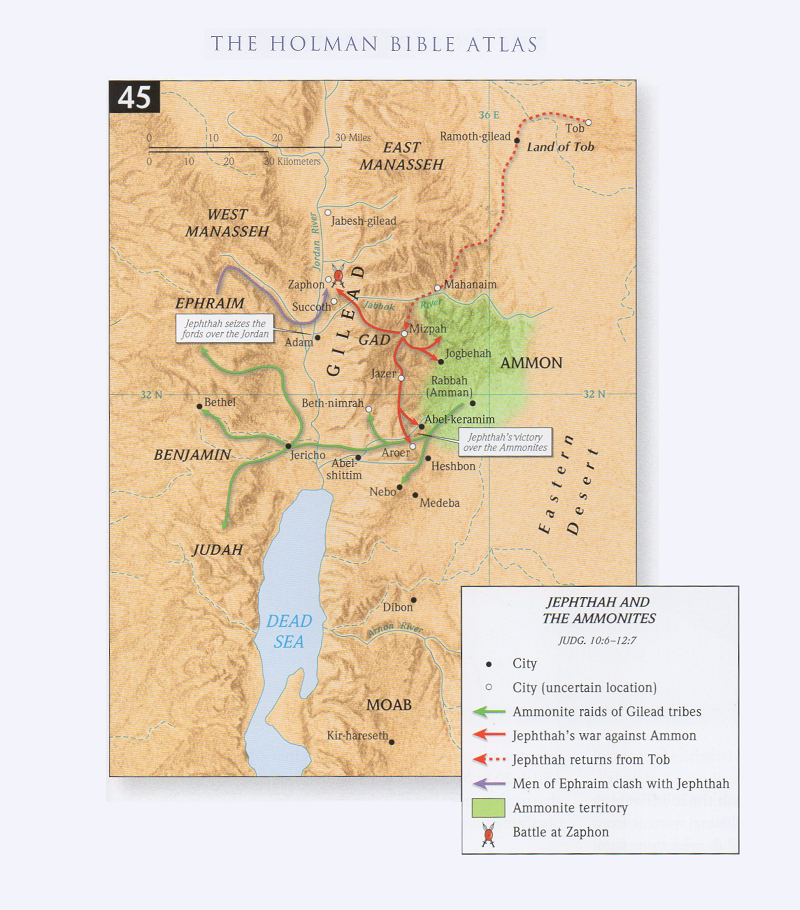Home
Study the Bible
Multimedia
About
Nebo (town)


Three variations of Nebo were found in the Old Testament of the Bible
There were a couple of towns called Nebo in the Old Testament - see the Ezra and Nehemiah references.
At least one of them resided in modern-day Jordan.
Moses died on Mount Nebo (Pisgah) in view of Canaan since he was denied the right to enter the "promised land".
Nebo was also the name of a Babylonian deity (false god) who only appeared in Isaiah 46:1. If the Babylonians used the tradition of taking names from the false gods they worshipped, Nebo-Sarsekim in Jeremiah 39:3 may have been the person that King James called Sarsechim who probably followed Nebo.

Nebo first appeared in 1 Chronicles 5:4-9:
4. The descendants of Joel: Shemaiah his son, Gog his son, Shimei his son,
5. Micah his son, Reaiah his son, Baal his son,
6. and Beerah his son, whom Tiglath-Pileser king of Assyria took into exile. Beerah was a leader of the Reubenites.
7. Their relatives by clans, listed according to their genealogical records: Jeiel the chief, Zechariah,
8. and Bela son of Azaz, the son of Shema, the son of Joel. They settled in the area from Aroer to Nebo and Baal Meon.
9. To the east they occupied the land up to the edge of the desert that extends to the Euphrates River, because their livestock had increased in Gilead.
Moses granted the area near Mount Nebo to the tribe of Reuben after they helped fight against the Canaanites. As verse 38 stated, Nebo was renamed after its capture.
Numbers 32:1-5,37-38:
1. The Reubenites and Gadites, who had very large herds and flocks, saw that the lands of Jazer and Gilead were suitable for livestock.
2. So they came to Moses and Eleazar the priest and to the leaders of the community, and said,
3. "Ataroth, Dibon, Jazer, Nimrah, Heshbon, Elealeh, Sebam, Nebo and Beon--
4. the land the LORD subdued before the people of Israel--are suitable for livestock, and your servants have livestock.
5. If we have found favor in your eyes," they said, "let this land be given to your servants as our possession. Do not make us cross the Jordan."
...
37. And the Reubenites rebuilt Heshbon, Elealeh and Kiriathaim,
38. as well as Nebo and Baal Meon (these names were changed) and Sibmah. They gave names to the cities they rebuilt.
Due to their proximity to each other, it's unclear whether this referenced the Mount or the town. Whatever the case, it was stated as part of the path
the Israelites took after wandering in the desert for 40 yrs. Numbers 33:47-48:
47. They left Almon Diblathaim and camped in the mountains of Abarim, near Nebo.
48. They left the mountains of Abarim and camped on the plains of Moab by the Jordan across from Jericho.
In Ezra 2:29, 52 people were from the town Nebo while Nehemiah 7:33
spoke of 52 from "the other Nebo". The passage including Ezra 10:43-44 said "those guilty of intermarriage":
43. From the descendants of Nebo: Jeiel, Mattithiah, Zabad, Zebina, Jaddai, Joel and Benaiah.
44. All these had married foreign women, and some of them had children by these wives.
Two prophets spoke against Moab, mentioning Nebo in Isaiah 15:2 and
Jeremiah 48:22. Jeremiah 48:1,21-24:
1. Concerning Moab: This is what the LORD Almighty, the God of Israel, says: "Woe to Nebo, for it will be ruined. Kiriathaim will be disgraced and captured; the stronghold will be disgraced and shattered.
...
21. Judgment has come to the plateau-- to Holon, Jahzah and Mephaath,
22. to Dibon, Nebo and Beth Diblathaim,
23. to Kiriathaim, Beth Gamul and Beth Meon,
24. to Kerioth and Bozrah-- to all the towns of Moab, far and near.